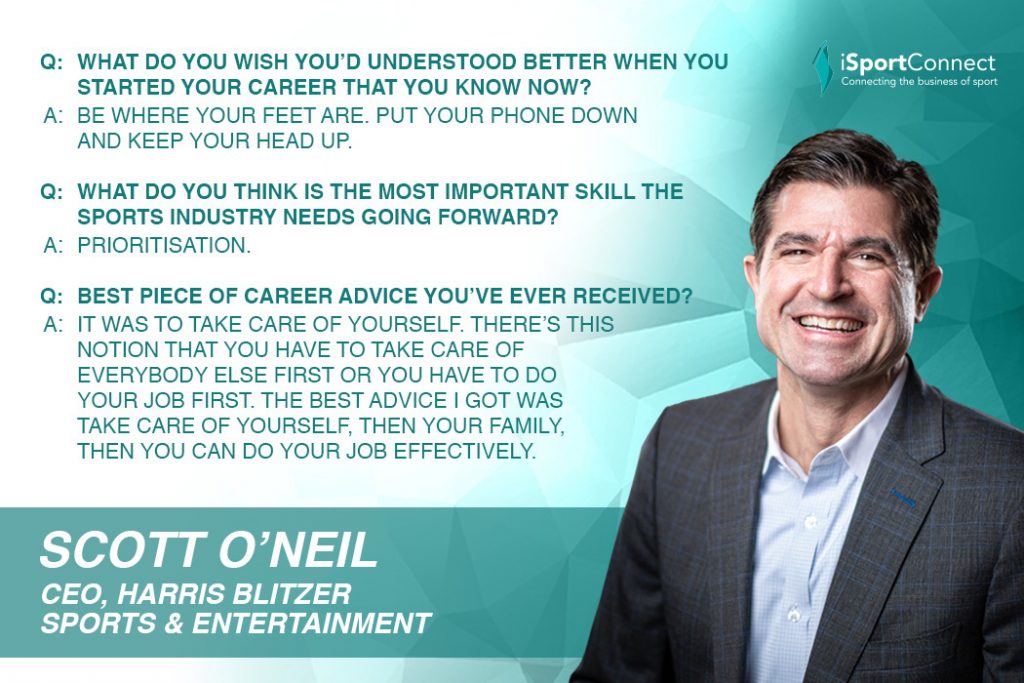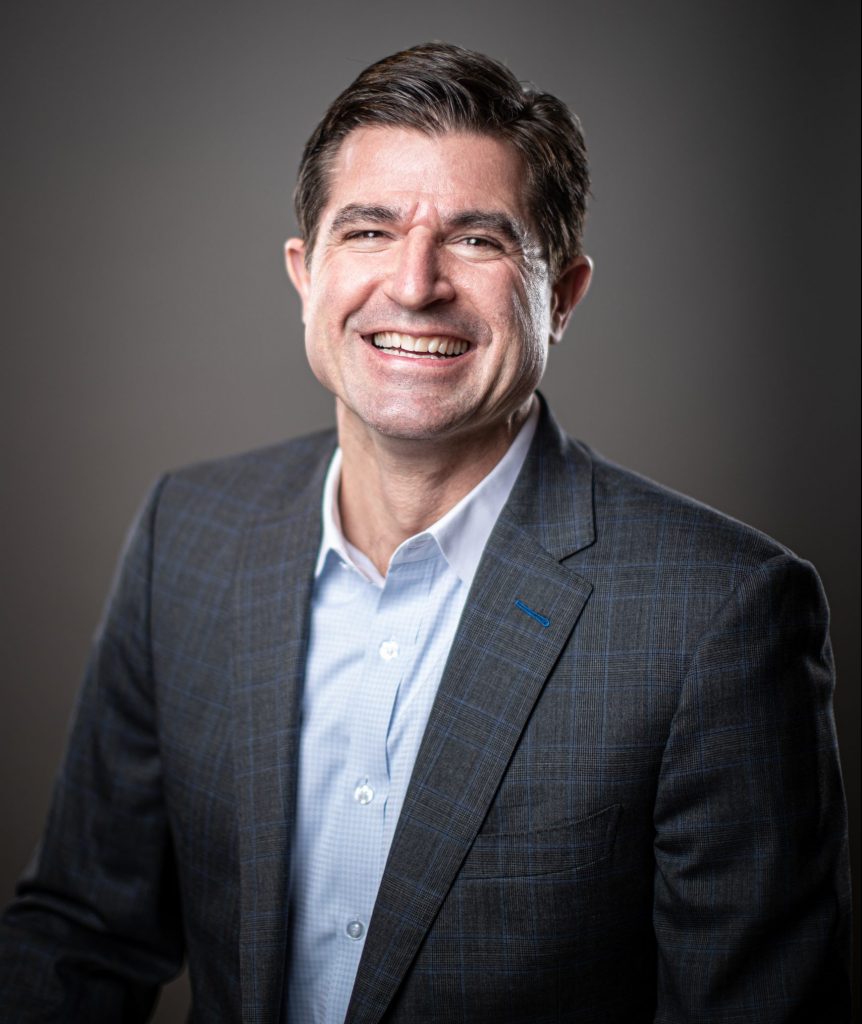“We’re All Trying To Evaluate ‘What’s Most Important?'”
June 30, 2021
For most CEO’s of sporting organisations, they have just the one franchise or property to worry about on a daily basis. Scott O’Neil, outgoing CEO of Harris Blitzer Sports & Entertainment, has had a very different proposition to consider each day in recent years. He has led the group covering two major franchises, the NBA’s Philadelphia 76ers and NHL’s New Jersey Devils, as well as a myriad of other companies.
O’Neil has this month released the book ‘Be Where Your Feet Are’, about learning and leading with purpose, understanding your core commitments as a leader, and living a life that is present and dedicated to continuous learning, featuring stories from his 25-year career in sport.
Scott recently talked to iSportConnect’s Ben Page about some of his key leadership lessons from sport, the growth that he has overseen while at HBSE and much more…
“The biggest one for me is that we have purpose, that sport matters,” Scott describes as his biggest learning for sport over the past almost 18 months of Covid. “We’ve come out of a time of high anxiety, uncertainty, frustration and disappointment. And sport, as we discover our ‘why’, our why is really simple, it’s to bring people together and create community and build bonds. To go through the highs and lows, high five a perfect stranger, hug someone you’ve never met before or get off your feet and scream like you’re a teenager.”
Scott worked regularly throughout his teenage years during high school prior to heading to Villanova University where he studied marketing, and it was only thanks to an internship that his career was immediately sent down the path of sports business.
“When I got to college, my father helped me get an internship in a sports marketing company and I couldn’t believe how happy people were. I couldn’t believe how many young people had positions that I thought were really interesting, I was captivated by them.
“In hindsight that was the moment that I knew that’s what I wanted to do, but it was a journey to get there.”
“I loved the energy running through the office. When there was a big event on a weekend, they weren’t ‘woe is me’, it was no pity party. So in hindsight that was the moment that I knew that’s what I wanted to do, but it was a journey to get there.”
Following graduation, his first sports role came as a marketing assistant at the New Jersey Nets. He credits the great leadership at the time of Jon Spoelstra, who he says was a ‘gift’ to have as a first leader.
“He was an incredible leader with this charisma, energy and enthusiasm. He took a liking to several of the young group and shepherded us and mentored us. I think about that now and it’s had such an impact on me and how I work with young people today.”
“When I think about why people leave jobs. They come in smart, they come in hardworking and enthusiastic, so it’s the job of the managers and directors to make sure it’s the greatest place to work in the world. If you can find that in a workplace, your career is going to be pretty good.”
O’Neil’s new bestselling book ‘Be Where Your Feet Are’ has recently hit the market, so why was now the right time to write the book, which centres on leadership and the learnings from a highly successful career in sport.
“For me it’s the anecdote to coming out of COVID. We’re talking about mind, body, soul and purposeful living. We’re all trying to evaluate ‘who am I’ and ‘what’s most important’?
“You’re seeing people leave very high profile jobs, I think they’re trying to figure out ‘Why am I doing this? Where should I be placing my energy? Where can I spend my time and make an impact? I think we’ve stared some pretty dark places in the face.
“All of us should be taking a long view now. Not 15-seconds Insta-famous, but one that says what am I going to accomplish in three years, what’s my plan to get there.”
“‘Trust The Process’ harkens back to my early Philadelphia 76ers days. We took a long view. All of us should be taking a long view now. Not 15-seconds Insta-famous, but one that says what am I going to accomplish in three years, what’s my plan to get there. I think my purpose is to hopefully help develop the next generation of great leaders, and this is a tool to do that.”
But has Insta-fame distorted the world and made it easier to get sucked into the 15-seconds-of-fame mindset?
“It looks good. Instagram looks great, Facebook looks amazing. I don’t lament it when my friends and family post wonderful pictures of their kids scoring a winning goal, those wonderful moments in life. It just doesn’t reflect reality. You’re not posting when you lose your job or have troubles at home.
“That’s what I talk about in the book, this is not a victory lap book,” Scott says, “It’s a book that says ‘let’s peep behind the curtain and possibly it’s not all bad’.
“You look back down at what you just climbed and think ‘wow, that was fun, what a journey.”
“We have this version of vision in the Insta-famous world where you get to the top of the mountain, which isn’t even a mountain – it’s a molehill – and you celebrate. There’s three things that happen at the top.
1 – “You figure out it’s pretty lonely up there.”
2 – “You look back down at what you just climbed and think ‘wow, that was fun, what a journey. Look at all the lessons I’ve learned, all the people I’ve met and how my life has changed’.”
3 – “You look for another mountain.”
“So it’s the journey, we have to actually embrace the learnings because that’s where it all happens.”
O’Neil says that establishing priorities are incredibly important, adding: “The people I’ve found have special relationships with their kids, partners and friends are those that be where their feet are. They put the phone down, they commit to meaningful moments and they don’t waste time, because how many office reruns can you watch or how many times can you scroll through Twitter? If Covid taught us one thing it’s make the most of the moments we have.”

As for the most important piece of learning from his career, Scott says being a great friend and teammate at work is crucial for those you grow up in the business with. “I look at the industry now and I have friends all over the world, running companies, occupying major jobs, doing really cool things.”
“I tell all the young people that come into HBSE, ‘Look around. These are the leaders of the sports entertainment world in 20 years, so you should know each other. Be friends, be a great teammate, play basketball, do stuff together’. I think that’s the big lesson.
The Harris Blitzer Sports and Entertainment group as a whole is one of the largest entities in sport, including two major franchises – the Philadelphia 76ers and New Jersey Devils – as well as the Prudential Center [home of the Devils], an Innovation Lab, a sports marketing company, affiliate teams such as the Delaware Blue Coats and Binghamton Devils and more! I ask O’Neil what has been the biggest challenge of leading an organisation that has so many different arms.
“I think the biggest challenge is where do you find growth,” he states. “How do you invest resources properly, what opportunities are big enough to match? We’re so big now that some of the opportunities we took early on are no longer worth the energy and resource.”
And the benefits of all those companies working under one umbrella?
“Talent. Talent, talent, talent. HBSE can attract and retain the best talent in the world. It’s different from going to a single sport organisation, and there’s nothing wrong with that, but now this is a global property. So it’s talent for sure.”
The hot topic of NFT’s appears unavoidable when looking at news within the business of sport at the moment, as every property looks to find an NFT partner. iSportConnect will be covering this topic in our upcoming Blockchain and NFT eMasterclass on Tuesday, July 20th, but what does Scott see from this new, potentially huge, revenue model for sport?
“I think blockchain can change the world. I really do.”
“Learning and growing outside of your core business is something you need to do every day. I spent a big chunk of Covid learning about blockchain, ironically enough. Probably 200 hours doing everything from watching talks, listening to podcasts, reading newsletters and watching YouTube.
“I think blockchain can change the world. I really do. From insurance to banking to a lot of our core businesses. I was not thinking sport would be the first and I should have put it together. We’re safe and easy, that’s what sport is, it’s why you buy us and why you put your name on us.
“The collectible business has to catch up to the world and NFTs help do that. When I came into this business 25 years ago, the notion players would understand their brand to the level they do now was non-existent. Players are smart and driven and now understand the impact they can have on the world.
“The way NFTs are now I think you’ll see a lot of evolution to make it a big business.”



